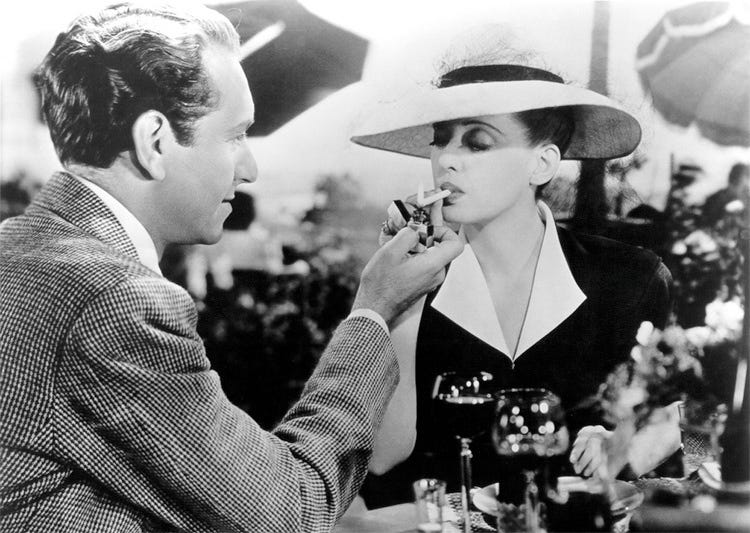The Bette Davis classic joins the Criterion Collection

Synopsis:
Nervous spinster Charlotte Vale (Bette Davis) is stunted from growing up under the heel of her puritanical Boston Brahmin mother (Gladys Cooper), and remains convinced of her own unworthiness until a kindly psychiatrist (Claude Rains) gives her the confidence to venture out into the world on a South American cruise. On board, she finds her footing with the help of an unhappily married man (Paul Henreid). Their thwarted love affair may help Charlotte break free of her mother’s grip — but will she find fulfillment as well as independence? Made at the height of Davis’s reign as the queen of the woman’s picture and bolstered by an Oscar-winning Max Steiner score, Now, Voyager is a melodrama for the ages, both a rapturous Hollywood romance and a poignant saga of self-discovery.

“The untold want by life and land ne’er granted,
Now voyager sail thou forth to seek and find.”
With a title fittingly lifted from a line in the works of Walt Whitman, Leaves of Grass, Now, Voyager opens with a glimpse into the downtrodden life of Charlotte Vale (Bette Davis). Approaching middle-age, she still lives a single life under the same roof as her domineering mother (Gladys Cooper). Control, judgement, and mean-spiritedness have crushed Charlotte, and her plight is recognized by psychiatrist Dr. Jasquith (a charming Claude Rains), who looks to free her from the restrictive grasp and liberate her inner self (makeover!), and then prescribes a trip to continue her recovery. On the ensuing cruise she meets Jerry (Paul Henreid), a kindly Frenchman who seems to be at the opposite end of the spectrum to her mother in terms of kindness, nurturing, and support. She continues to blossom, and feelings emerge and deepen between the pair. A complication emerges in that Jerry is already married, with his sense of duty to his estranged wife and troubled younger child preventing him from considering a separation. Because of this, the pair go their separate ways, but this is not the end of their journey together.
The whole premise works so well because of two wonderfully sympathetic leads in Charlotte and Jerry, each entirely deserving of our sympathy. Davis and Henreid have a chemistry to delight and root for, and their genuine connection invests you further still, a karmic hope for their future to balance out the unjust past their characters have suffered and the similar burdens they share. In the trip together on a cruise ship, with Charlotte breaking out of her shell more and more to spend time with Jerry, there is a caution to them both that peels away as they delightfully realize what kind of connection they have. Now, Voyager is a melodrama that segues into a romance, while along the way being something of a character study for this woman. Despite sounding simple, it packs in plenty in this respect, not just the resolution of this blossoming romance, but Charlotte’s new found confidence and her need to tackle the looming specter of her mother, not to mention the issue of Jerry’s wife and troubled daughter Tina. It all ties up as you’d expect from this era, rather neatly with a little tug at the heartstrings, but that doesn’t lessen its impact. What also stands out is how so many elements at play feel so progressive for the 1940; as such, it’s unsurprising how the film seems to offer up a template that so many have followed in its wake.

The Package
Criterion offer up a new 4K restoration and transfer, which looks rather glorious. Deep blacks and a good range of contrast and saturation highlight plenty of detail ad texture in the image, without sacrificing a natural filmic quality. Extra features are:
- Episode of The Dick Cavett Show from 1971 featuring actor Bette Davis: Running nearly an hour in length, it’s a delight to see Davis cut loose and unleash her personality and opinions.
- Interview with actor Paul Henreid from 1980: Just a few minutes long, as such doesn’t get into too much detail.
- New selected-scene commentary on the film’s score by scholar Jeff Smith: In lieu of a full length commentary, this is a pretty great deep dive into the musical compositions in the film.
- New interview with film critic Farran Smith Nehme on the making of the film: About 30 minutes long, and a solid rundown of the film, its production, and legacy.
- New interview with costume historian Larry McQueen: Some of the garb in the film is stunning, so it’s nice to see that aspect of the production get a little love.
- Two radio adaptations from 1943 and 1946: Each are around 45 minutes, and it’s rather cute to hear these earlier versions unfold.
- Plus — An essay by scholar Patricia White and a 1937 reflection on acting by Davis: Included in the liner booklet, which also details the restoration of the film.
- New cover art by Sam Hadley

The Bottom Line
Now, Voyager charts a course that will feel familiar to many, but as one of the first to do so, it stands out even nearly 80 years after release. Bette Davis is an icon of cinema, and this film is a potent reminder why. It’s just a delight to watch this film unfold, and Criterion have put together a splendid package to celebrate its charm.

Now, Voyager is available via Criterion from November 26th, 2019.



